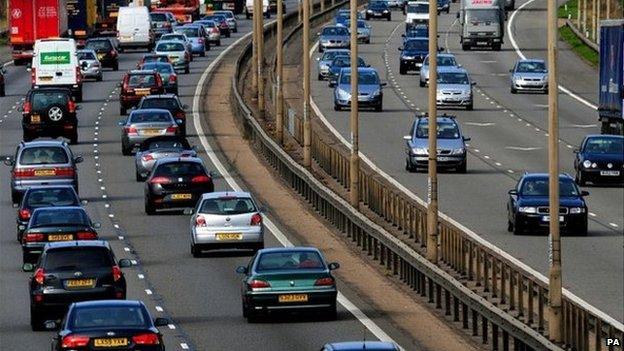Insurance premiums for most motorists 'to fall' as driving records go online
- Published

Drivers will be able to leave the paper sections of their licence at home from 2015
Moving all driving records online could reduce the cost of car insurance for most people, ministers have said.
The migration, which will be complete by mid-2015, will end the need for the "paper counterpart" document drivers have to keep with their licence.
Insurers said "honest" motorists could see premiums fall by up to £15 a year.
At the moment, insurers cannot check licence or traffic offence details when they sell policies, meaning they have to "price in" risk factors.
The Association of British Insurers says premiums are pushed up by the fact that firms have to take account of the risk that drivers either do not tell the truth about speeding points to get a lower quote, or simply make a mistake.
'On trust'
"Significant cost savings" would also result from "reducing the need to obtain paper copies of licences from policyholders", the association added, external.
A system due to be launched by the Driver and Vehicle Licensing Agency (DVLA) will allow insurers to access the information using an individual's licence number.
Cabinet Office minister Francis Maude said anyone with a driving licence would be able to use the online database while there will be an assisted service for those who find it difficult to use the internet. They will be able to get help from a call centre, library or post office.
Most of the UK's 40 million drivers would see falls in premiums, he suggested.
"This will enable insurers, for example, to price much more accurately, because they will not have to take anything on trust," he said.
Driving records are one of 25 public services set to go digital by 2015, with Mr Maude claiming the UK now leads the world in online migration of public services.
The paper counterpart to the driving licence photo card is due to be phased out by 2015 while it was announced in December that paper car tax discs would also be scrapped.
The DVLA said that "although some services cannot be delivered digitally, such as assessing a customer's fitness to drive, we can improve the processes supporting the delivery of these services through making greater use of digital tools".
It has not ruled out job cuts at the DVLA headquarters in Swansea, after the new digital system launches in June, but is awaiting the outcome of a review of staffing levels.
'Not cheaper'
The car rental industry will also be affected by the new system - but it denied government claims that it would reduce the cost of hiring a vehicle.
"There are around 10 million car rental transactions in the UK each year and the majority of rental bookings are approved very quickly and at no cost by checking the driver endorsement and qualification information contained on the driver licence counterpart," said a spokesman for the British Vehicle Rental and Leasing Association.
When that is not available, rental companies rely on the DVLA's expensive telephone-based system to access driver information.
"The DVLA has confirmed its plans to withdraw the counterpart from 2015 and has promised the industry that it will provide a viable online database.
"This project has not yet begun, but we hope that any solution will be cost-effective and provide real-time, 24/7 access. Even if this is achieved, it is very unlikely to be quicker or cheaper than the current system of checking the paper driver licence counterpart."
Initially, the new system will check users' identities by asking for their postcode and National Insurance number but, in common with other digital government services, it will eventually allow people to use their bank's system to prove their identity on websites providing government services.
Clicking on an icon will allow people to complete the check required by their bank, mobile phone company, or other service provider.
The approach would cut the number of passwords people need to remember, and avoid the need for a central government system to establish identities.
"This is something that is a problem for countries that do not have an ID card system and a national ID database," said Mr Maude.
- Published5 December 2013
- Published2 January 2014
- Published27 July 2013